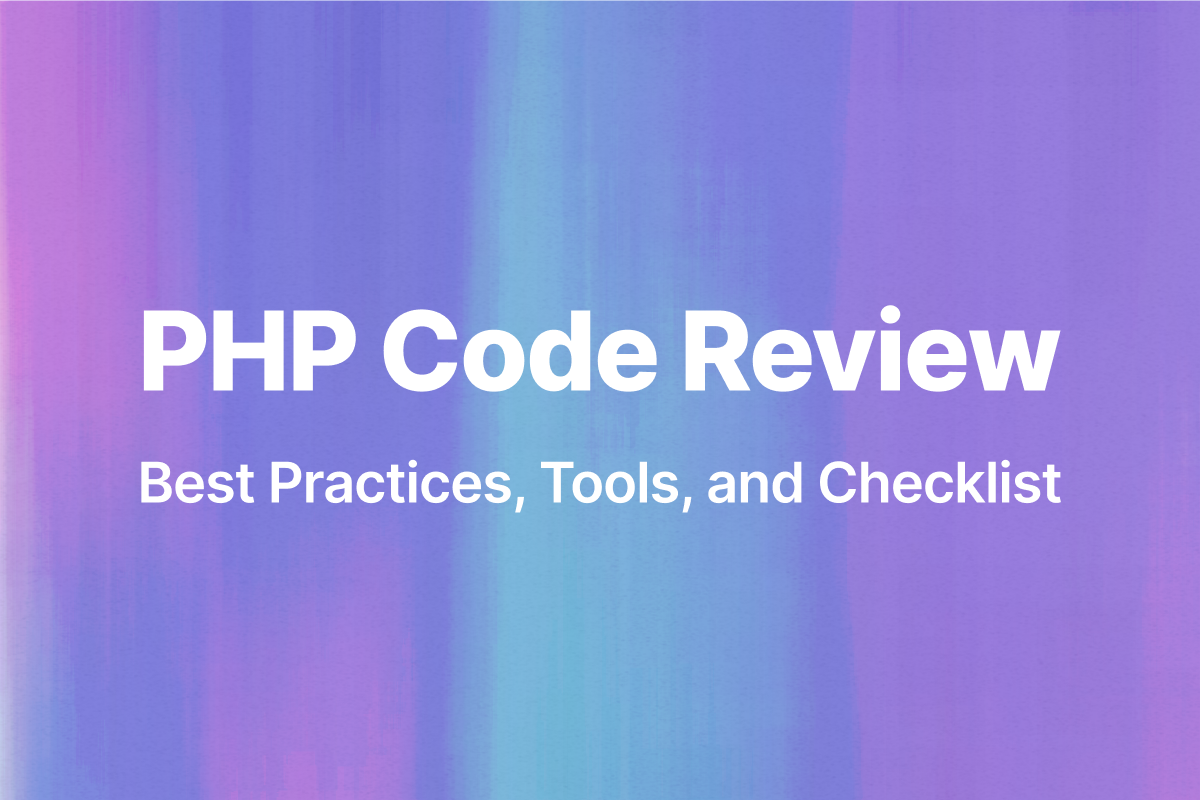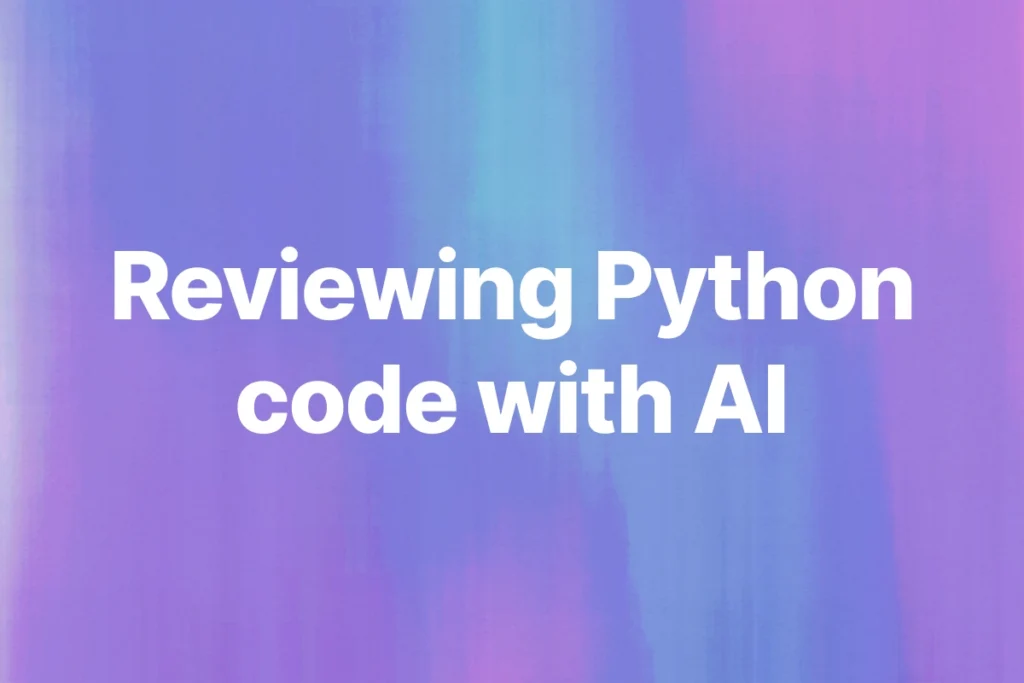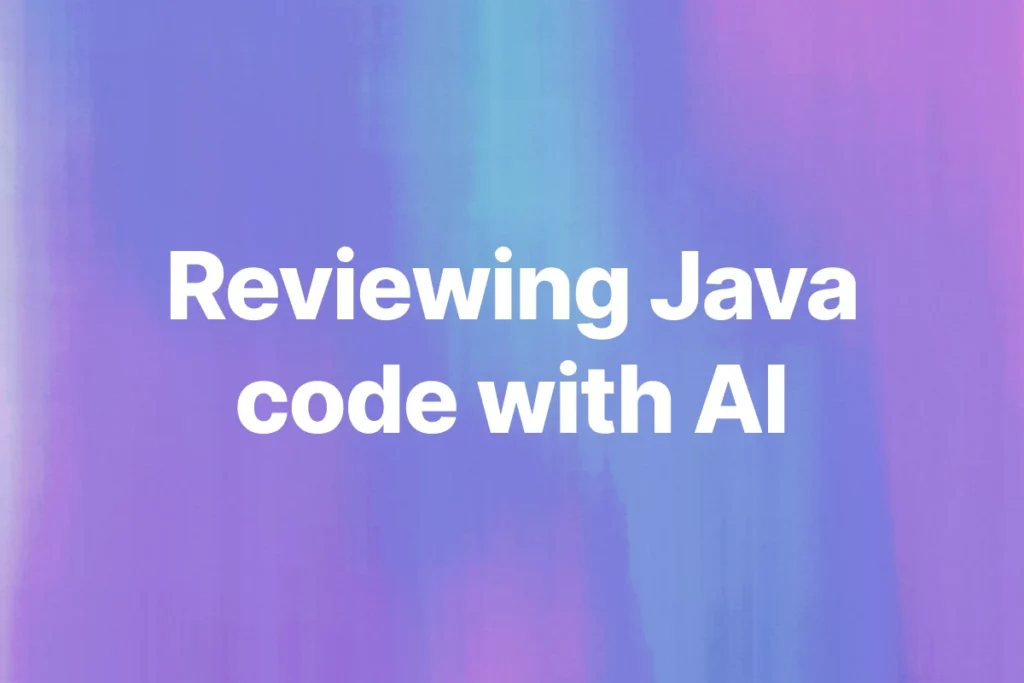PHP code reviews help developers catch bugs, enforce standards, and improve long-term maintainability before code reaches production. Without consistent review processes, teams introduce silent errors, duplicate logic, and architectural drift—especially in large or legacy PHP applications.
This guide explains how to structure effective PHP and Laravel code reviews using industry best practices. It shows how teams can integrate code analysis into their workflow and highlights why traditional tools fall short in real-world scenarios.
You’ll learn:
- What experienced engineers look for in PHP code reviews
- How to use one tool — Bito — to handle both static analysis and intelligent review
- Which issues to flag and how to build a checklist that scales with your team
Whether you’re reviewing pull requests in a fast-paced product team or managing a large monolith with mixed code quality, this guide will help you improve code reliability, clarity, and security through code review best practices.
What is a PHP code review and why it matters
A PHP code review is a structured examination of code changes to evaluate correctness, security, performance, and alignment with team standards. Unlike automated testing, which verifies output, a code review evaluates the how and why behind implementation decisions.
In PHP—where procedural code, legacy practices, and inconsistent patterns are still common—manual and tool-assisted code reviews play a crucial role in controlling technical debt. They allow teams to prevent recurring bugs, catch silent architectural regressions, and transfer knowledge across contributors.
Well-run PHP code reviews do more than improve code quality:
- They make onboarding smoother by exposing junior devs to team practices.
- They prevent knowledge silos by encouraging peer collaboration.
- They reduce production incidents by stopping unsafe changes early.
Developers often treat reviews as a gatekeeping step. In reality, they’re a form of collaborative design validation—a chance to ensure that every line of PHP you ship is robust, readable, and ready for scale.
In the next section, we’ll look at what effective reviewers actually focus on during PHP code reviews and how those goals translate into better software.
The purpose behind every review
You’re not reviewing code to nitpick variable names. You’re doing it to ensure every line merged adds value. Here’s what an effective review should focus on:
- Correctness: Does the code do what it’s supposed to do? Are edge cases handled?
- Security: Are inputs properly sanitized? Are SQL queries parameterized?
- Readability: Can the next person who reads this code understand what’s going on?
- Performance: Are there unnecessary loops or queries?
- Standards: Is the code aligned with PSR-12 or your team’s internal guidelines?
- Testability: Can you write meaningful tests for this code? Are there any?
Your job as a reviewer is to raise red flags and suggest better paths—not to be a gatekeeper. Code reviews are collaborative.
How to approach a PHP code review
1. Start with context
Before reviewing any lines, understand what the pull request is solving. If the description is vague, ask questions before diving in. Never review code without understanding the problem it’s addressing.
Ask yourself: Does the implementation match the intent?
2. Review in chunks
Don’t try to review 1,000 lines of code at once. Aim for 200–400 lines per review. Large diffs reduce your focus and increase the chance of missing important problems.
Focus on:
- One feature or module per review
- One responsibility per method or class
- One topic per discussion thread
3. Comment with purpose
Your feedback should be constructive and actionable. Avoid vague comments like “this is messy” or “I don’t like this.” Be specific.
Examples:
- ✅ Consider splitting this into two methods. It’s doing multiple things: validating input and saving to the DB.
- ✅ This line may throw a warning if
$useris null. Add a null check before callinggetEmail().
Be honest, but always professional. You’re helping improve code, not criticizing people.
Best tools for PHP code review
Most tools on the market either offer static analysis (like PHPStan or Psalm) or linting (like PHP_CodeSniffer), but they lack understanding of business logic, project-specific rules, or architectural context.
That’s why, after using all the major PHP code review tools over the years, I only recommend Bito for modern teams.
Also read: AI Code Reviews vs Static Analysis
| Feature / Tool | Bito | PHPStan | Psalm | PHP_CodeSniffer | PHPMD (PHP Mess Detector) |
|---|---|---|---|---|---|
| Code logic analysis | ✅ Understands intent, detects logical flaws like unreachable code, misuse of conditionals, broken flows | ❌ Limited to type inference and class analysis | ❌ Similar to PHPStan with more advanced typing | ❌ Ignores logic, focuses on formatting | ❌ No logic insight—flags surface-level smells |
| Custom code review guidelines | ✅ Define team-specific rules (e.g., disallow direct DB access in controllers) | ❌ No rule customization beyond levels | ⚠️ Limited through plugin architecture | ⚠️ Some config, but formatting only | ❌ Rigid rule set, hard to extend |
| Built-in static analysis | ✅ Bundled; no setup needed | ✅ Strong static typing | ✅ Advanced type checks and taint analysis | ❌ Not designed for static analysis | ⚠️ Minimal static patterns |
| Built-in linting / PSR compliance | ✅ Supports PSR-1 / PSR-12, can identify style issues | ❌ Must be combined with a linter | ❌ Must pair with php-cs-fixer or PHPCS | ✅ Enforces PSR-12 and custom sniffs | ❌ Style agnostic |
| Code smell detection | ✅ Flags deep complexity issues, overuse of conditionals, large classes | ⚠️ Detects dead code and unreachable paths | ⚠️ Similar, but sometimes overstrict | ❌ No smell detection | ✅ Flags long methods, big classes, duplications |
| Review feedback quality | ✅ Context-aware, human-like explanations, highlights implications of bad design | ❌ Raw CLI errors or type violations | ⚠️ Verbose, requires interpretation | ❌ Style errors only | ⚠️ Basic, hard to interpret in larger diffs |
| Team collaboration | ✅ Inline PR suggestions in GitHub, GitLab, Bitbucket; threaded and scoped | ❌ CLI only or IDE plugin | ❌ CLI focused, no collaborative layer | ❌ Local or CI hooks only | ❌ Local reports only |
| Integration with CI/CD | ✅ Easy setup, works out of the box with most CI tools | ✅ Native support for CI | ✅ Good CI support | ✅ Often used as pre-commit hook | ✅ Works via command-line in CI/CD |
| Onboarding time | 🟢 ~5 minutes with GitHub or GitLab setup | 🔵 30–60 minutes; needs config and ruleset | 🔵 45–90 minutes; steep learning curve | 🟢 15–30 minutes for basic setup | 🟡 30+ minutes; requires tuning |
| Scalability for large codebases | ✅ Performs fast analysis, flags high-impact areas first | ⚠️ Slows down significantly on large projects | ⚠️ High CPU usage on monoliths | ✅ Scales well, but only does style checks | ⚠️ May produce noise in complex systems |
| Best for | Teams needing full-scope, logic-aware reviews with team-specific rules | Developers needing strict type-level validation | Teams wanting granular type safety & edge-case detection | Enforcing team code style and formatting rules | Refactoring legacy code and identifying smells |
Here is the list of best PHP code review tools:
1. Bito AI Code Review Agent (best option)
Bito is not just a linter. It acts like a senior developer reviewing your pull request. Unlike rule-based tools, Bito analyzes your code’s intent and logic using generative AI.
Also read: Reasons to Try Bito’s AI Code Review Agent
Here’s what makes Bito stand out:
a. Understands code logic, not just syntax
Most static analyzers flag undefined variables or formatting errors. Bito goes further. It reads the intent behind your functions and points out flaws in logic that linters can’t catch.
For example, in one of our Laravel projects, we had a pull request that passed all static analysis, but Bito flagged a logical issue: an if statement checking is_null($user) after trying to access $user->id. No tool caught it—Bito did.
b. Built-in static analysis and linting
Unlike most AI tools, Bito doesn’t require you to chain external linters or analyzers. It comes with built-in support for:
- PSR-1 / PSR-12 checks
- Dead code detection
- Cyclomatic complexity warnings
- Type inconsistencies
- Code style drift across your repo
This makes your pipeline leaner and easier to manage. No extra setup.
c. Custom review guidelines per project
You can define your own team’s review standards, and Bito will enforce them. We used this feature to flag any controller method over 20 lines, restrict static method use, and block direct access to superglobals.
No other tool gave us this level of project-specific enforcement.
d. Human-like review comments
Bito doesn’t throw out cryptic warnings. It gives clear, actionable feedback like:
“This service method is modifying a model directly. Consider decoupling logic via a repository or command object to maintain SRP.”
That’s the kind of review you’d expect from a senior dev—not a static scanner.
e. Integrated with your workflow
- Integrates with GitHub, GitLab, and Bitbucket.
- Full CI/CD integration
If you work in a fast-moving team or have limited senior reviewers, Bito is a must-have. It helps maintain quality without slowing you down.
2. PHP_CodeSniffer
- Enforces PSR-1, PSR-12
- Flags style and formatting issues
- Best used as a pre-commit hook
3. PHPStan and Psalm
- Both are static analyzers
- Catch undefined variables, wrong type usage, dead code
- Psalm is stricter and more configurable
4. PHPMD (PHP Mess Detector)
- Flags long methods, large classes, duplicated code
- Useful for maintaining code cleanliness in legacy projects
5. SonarQube
- Gives dashboards and visual code quality trends
- Ideal for teams needing KPIs or compliance audits
Common mistakes you should catch during reviews
Every PHP project, especially legacy ones, carries its share of risks. These are the issues experienced reviewers watch out for:
- SQL injection risks:
$db->query("SELECT * FROM users WHERE id = $id")should never happen. Use prepared statements. - XSS vulnerabilities: Watch how user input is echoed in HTML. Escaping is non-negotiable.
- Mass assignment in Laravel:
Model::create($request->all())without$fillabledefined is dangerous. - Global variables and hidden dependencies: Code relying on
$_SESSION,$_GET, or$_POSTinside deeply nested methods makes unit testing harder. - Cyclomatic complexity: Nested conditionals or switch statements longer than 5–6 branches should be refactored.
- Hardcoded paths and secrets: Never hardcode
/var/www/htmlor API keys in code. Use.envor config files.
If you’re not looking for these, you’re not reviewing properly.
What standards should you enforce?
Start with PSR-12. It’s widely accepted, and tools like Bito make it easy to enforce.
But don’t stop there. Most teams evolve their own rules:
- Require return types for all public methods.
- Enforce class-per-file structure.
- Avoid static methods in business logic.
- Prohibit use of
newinside controllers—use dependency injection instead.
Document these rules. Make them part of your onboarding and enforce them with automation.
Writing and sharing code review feedback effectively
Here’s where most developers go wrong: they either sugarcoat bad code or become overly blunt.
The best feedback is:
- Objective: Talk about the code, not the person.
- Specific: Don’t say “bad design.” Explain what’s wrong and why.
- Collaborative: Ask questions. Suggest alternatives.
Use inline comments where possible. Use review summaries to mention overarching concerns or architectural questions.
Example:
❌ “This is wrong. Fix it.”
✅ “This class handles DB calls and validation. Consider moving validation to a dedicated service to follow SRP.”
If something’s a blocker, mark it. If it’s optional, say so clearly.
PHP security: things you must review every time
Security can’t be an afterthought. Always check:
- Are all user inputs validated? Use
filter_var()or form request classes. - Is output properly escaped? Especially in Blade, Twig, or raw PHP templates.
- Are database queries parameterized? Use PDO or ORM bindings.
- Is file access safe? Avoid using user inputs in
include(),require(), or file paths. - Are tokens being verified? CSRF protection for all form submissions.
If you’re tired or unsure, flag it. A second opinion is better than shipping a vulnerability.
A code review checklist for PHP developers
Use this checklist to guide your next review:
✅ Is the code solving the problem clearly and completely?
✅ Are all edge cases handled?
✅ Are there any obvious security issues (XSS, SQLi, CSRF)?
✅ Is the code readable and consistent with the project style?
✅ Are functions/methods small, focused, and testable?
✅ Are there meaningful unit or feature tests added?
✅ Is error handling consistent and appropriate?
✅ Have you avoided duplicate logic or copy-paste code?
Final thoughts
If you want clean, secure, and scalable PHP applications, code reviews are non-negotiable. They help you prevent defects, share knowledge, and hold quality standards across teams.
Use smart tools like Bito to automate logic review. Supplement them with static analysis and enforce your standards through CI/CD. But most importantly, review code with intent—understand what it’s trying to do, why it’s written that way, and how it fits into the bigger picture.
Good code is collaborative. So is good code review.






